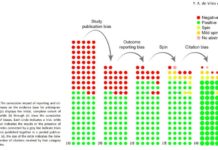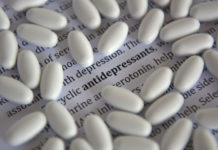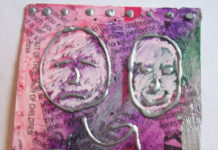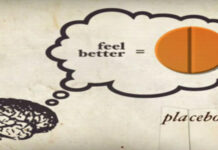New Review of Antipsychotics for Schizophrenia Questions Evidence for Long Term Use
A systematic review of the limited research available on the long-term effects of antipsychotics finds fewer symptoms in those off of the drugs.
Researcher Challenges Clinical Effectiveness of Antidepressants
A new article in BMJ Evidence-Based Medicine addresses common misinterpretations of the efficacy research on antidepressants.
Publication Bias Inflates Perceived Efficacy of Depression Treatments, Study Finds
Researchers report the cumulative effects of major biases on the apparent efficacy of antidepressant and psychotherapy treatments.
Review of Pediatric Antidepressant Studies Finds Evidence of Benefit Lacking
Review of pediatric antidepressant studies finds the vast majority are negative on primary outcomes and an increased risk for suicidality.
Prominent Researcher and Psychotherapist Questions “Evidence-Based Therapy”
Dr. Johnathan Shedler recently published a paper critiquing how the term “evidence-based” is being used in the field of psychotherapy.
Researchers Question “Gold Standard” Status of Cognitive Behavioral Therapy
Researchers argue for plurality and diversity among psychotherapy approaches and question the perceived superiority of Cognitive Behavioral Therapy (CBT).
High Rates of Questionable Research Practices Found in Ecology and Evolution
A new study, published online by the Open Science Foundation, suggests that questionable research practices (QRPs) are prevalent in the fields of ecology and evolution.
A Tale of Two Studies
With increasing evidence that psychiatric drugs do more harm than good over the long term, the field of psychiatry often seems focused on sifting through the mounds of research data it has collected, eager to at last sit up and cry, here’s a shiny speck of gold! Our drugs do work! One recently published study on withdrawal of antipsychotics tells of long-term benefits. A second tells of long-term harm. Which one is convincing?
Psychology Textbooks Promote Misinformation About Intelligence
In a new study, researchers examined 29 popular introduction to psychology textbooks and found that almost 80% included misinformation about intelligence.
New Study Concludes that Antidepressants are “Largely Ineffective and Potentially Harmful”
A new study published in Frontiers in Psychiatry concludes that “antidepressants are largely ineffective and potentially harmful.”
Transcranial Electrical Stimulation Can’t Directly Alter Brain Patterns, Researchers Find
Due to the thickness of the scalp and skull, transcranial electrical stimulation (TES) is incapable of targeting networks of neurons in the brain.
Researchers Question Findings of Some Correlational Studies
In a new study, researchers argue that correlational studies may not sufficiently account for alternative explanations, and offer suggestions for mitigating this danger.
Researchers Challenge Industry-Friendly Depression Guideline
Review of a new mixed depression guideline reveals financial bias of guideline developers and lack of evidence supporting recommendations for prescribing of antipsychotics.
New Study Challenges Impartiality of Peer Review
New research shows that more connected and well-known researchers are more likely to be published, even when they receive negative reviews.
Researchers Expose Pharmaceutical Industry Misconduct and Corruption
Corruption of pharmaceutical industry sponsored clinical trials identified as a “major obstacle” facing evidence-based medicine.
Scientists Call for Increased Transparency in Research
Scientists at the Yale Collaboration for Research Integrity and Transparency (CRIT) published a new policy paper this month criticizing the current state of biomedical research and calling for improved transparency in research methods.
Outcome Reporting Bias in Antipsychotic Medication Trials
A new study in the journal Translational Psychiatry, an influential journal in biological psychiatry published by Nature, challenges the state of the research on antipsychotic drugs.
SSRI Ineffective at Treating Depression in Individuals with Chronic Kidney Disease
Dr. Madhukar Trivedi and colleagues find that the SSRI sertraline does not reduce depressive symptoms any more than placebo in people with Chronic Kidney Disease.
Rigorous Study Finds Antidepressants Worsen Long-Term Outcomes
A new study conducted by Jeffrey Vittengl at Truman University has found that taking antidepressant medications resulted in more severe depression symptoms after nine years.
Brain Imaging Results Biased by Lack of Representative Data
What does "normal" brain development throughout childhood look like? It may depend on your demographics.
Review Finds Little Evidence that Electroconvulsive Therapy is Effective for Depression
Researchers examined the dearth of support for Electroconvulsive therapy (ECT) for depressive symptoms in light of studies detailing the associated risks.
Researchers Find Inadequate Reporting of the Dangers of Ketamine Treatment for Depression
Researchers report that dangerous side effects are not being adequately reported in the trials of ketamine for depression.
Study Investigates Physicians’ Beliefs About Placebo and Nocebo Effects of Antidepressants
Surveyed doctors overestimate pharmacological effects of antidepressants and underestimate placebo effects.
‘Salami Slicing’ Found in Analyses of Antipsychotic Trials
Evidence of duplicate publishing in articles analyzing data from clinical trials testing second-generation antipsychotics for depression
Researchers Find that Textbooks Include Biased Information About ADHD
A review of academic textbooks finds that they often leave out effect sizes and molecular genetics findings, both of which suggest minimal impact of genetics on ADHD. Instead, textbooks focus on overblown conclusions from behavioral studies.

































